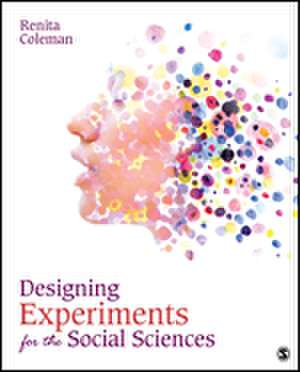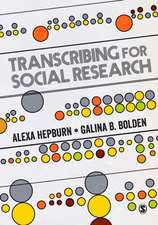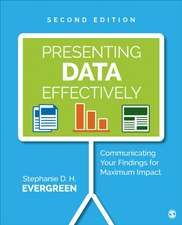Designing Experiments for the Social Sciences: How to Plan, Create, and Execute Research Using Experiments
Autor Renita Colemanen Limba Engleză Paperback – 21 oct 2018
“This book is a must for learning about the experimental design–from forming a research question to interpreting the results this text covers it all.”
–Sarah El Sayed, University of Texas at ArlingtonDesigning Experiments for the Social Sciences: How to Plan, Create, and Execute Research Using Experiments is a practical, applied text for courses in experimental design. The text assumes that students have just a basic knowledge of the scientific method, and no statistics background is required. With its focus on how to effectively design experiments, rather than how to analyze them, the book concentrates on the stage where researchers are making decisions about procedural aspects of the experiment before interventions and treatments are given.
Renita Coleman walks readers step-by-step on how to plan and execute experiments from the beginning by discussing choosing and collecting a sample, creating the stimuli and questionnaire, doing a manipulation check or pre-test, analyzing the data, and understanding and interpreting the results. Guidelines for deciding which elements are best used in the creation of a particular kind of experiment are also given. This title offers rich pedagogy, ethical considerations, and examples pertinent to all social science disciplines.
Preț: 727.26 lei
Preț vechi: 982.78 lei
-26% Nou
Puncte Express: 1091
Preț estimativ în valută:
139.18€ • 151.13$ • 116.91£
139.18€ • 151.13$ • 116.91£
Carte disponibilă
Livrare economică 01-15 aprilie
Livrare express 15-21 martie pentru 35.26 lei
Preluare comenzi: 021 569.72.76
Specificații
ISBN-13: 9781506377322
ISBN-10: 1506377327
Pagini: 408
Dimensiuni: 187 x 232 x 24 mm
Greutate: 0.66 kg
Ediția:1
Editura: SAGE Publications
Colecția Sage Publications, Inc
Locul publicării:Thousand Oaks, United States
ISBN-10: 1506377327
Pagini: 408
Dimensiuni: 187 x 232 x 24 mm
Greutate: 0.66 kg
Ediția:1
Editura: SAGE Publications
Colecția Sage Publications, Inc
Locul publicării:Thousand Oaks, United States
Recenzii
“This book offers many examples and hands-on instruction that can help students learn how to conduct experiments.”
“This book is a must for learning about the experimental design–from forming a research question to interpreting the results, this text covers it all.”
“This text provides students with an excellent explanation of experimental methodology: not just descriptions of elements of the experiment method, but understanding of where those elements came from, how and why they work together, and how students can become scholars.”
“This is a comprehensive text on experiments, clearly and engagingly written, with many excellent examples. Renita Coleman has included everything the student will need to develop, design, and execute a methodologically-sound experiment.”
“This textbook is detailed and well organized, with each topic progressing logically to build on foundational knowledge. Students will find it easy to master research concepts, and practice using the exercises and examples provided. The ‘Study Spotlight’ scenarios and practical examples are effective tools to demonstrate research designs, and the ‘Test Your Knowledge Quizzes’ reinforce student learning.”
“This book is well-written and readable. If you need to grasp concepts of experimental designs, this book guides you as to what the experimental designs are, and what you should keep in mind in conducting your studies.”
“This book is a must for learning about the experimental design–from forming a research question to interpreting the results, this text covers it all.”
“This text provides students with an excellent explanation of experimental methodology: not just descriptions of elements of the experiment method, but understanding of where those elements came from, how and why they work together, and how students can become scholars.”
“This is a comprehensive text on experiments, clearly and engagingly written, with many excellent examples. Renita Coleman has included everything the student will need to develop, design, and execute a methodologically-sound experiment.”
“This textbook is detailed and well organized, with each topic progressing logically to build on foundational knowledge. Students will find it easy to master research concepts, and practice using the exercises and examples provided. The ‘Study Spotlight’ scenarios and practical examples are effective tools to demonstrate research designs, and the ‘Test Your Knowledge Quizzes’ reinforce student learning.”
“This book is well-written and readable. If you need to grasp concepts of experimental designs, this book guides you as to what the experimental designs are, and what you should keep in mind in conducting your studies.”
Cuprins
Preface
Acknowledgments
About the Author
1. Discovering Cause and Effect
Causation
Experiments Compared to Other Methods
Basic Criteria for Experiments
Elements of Experiments
Starting a Study of Your Own
2. Ethics and Famous Experiments in History
The Scurvy Studies
The Contributions of Charles Peirce
Ronald Fisher’s Plots and Tea
B. F. Skinner: Small Samples, High Tech
Stanley Milgram Shocks the World
Philip Zimbardo: Raising Consciences in a Stanford Basement
Conclusion
3. Theory, Literature, and Hypotheses
The Literature Review
Hypotheses and Research Questions
4. Types of Experiments
Campbell and Stanley’s Typology of Experiments
Quasi Experiments
Natural Experiments
Field Experiments
5. Internal and External Validity
Ecological and External Validity
Generalizability
Cause and Effect
Logical Inference
Replication
Internal Validity
6. Factorial Designs
Single-Factor Designs
Factorial Designs
How Subjects Are Used in Designs
Control Groups
7. Random Assignment
The Purpose of Random Assignment
Operationalizing Random Assignment
Reporting Random Assignment
Balanced and Unbalanced Designs
Checking That Random Assignment Was Effective
Blocking, Matching, and Other Strategies
Random Assignment of Other Things
Random Assignment Resistance
8. Sampling and Effect Sizes
Student Samples
Amazon’s Mechanical Turk
Other Subject Sources
Recruiting
Incentives
Sample Size and Power
9. Stimuli and Manipulation Checks
Examples of Stimuli
Advice on Creating Stimuli
Manipulation Checks
Reporting the Stimuli and Manipulation Checks
10. Instruments and Measures
Instruments
Measurement Issues
11. The Institutional Review Board and Conducting Ethical Experiments
Institutional Review Boards
Ethical Issues in Experiments
Protecting Subjects
Researcher Issues
Pilot Studies
Glossary
Index
Acknowledgments
About the Author
1. Discovering Cause and Effect
Causation
Experiments Compared to Other Methods
Basic Criteria for Experiments
Elements of Experiments
Starting a Study of Your Own
2. Ethics and Famous Experiments in History
The Scurvy Studies
The Contributions of Charles Peirce
Ronald Fisher’s Plots and Tea
B. F. Skinner: Small Samples, High Tech
Stanley Milgram Shocks the World
Philip Zimbardo: Raising Consciences in a Stanford Basement
Conclusion
3. Theory, Literature, and Hypotheses
The Literature Review
Hypotheses and Research Questions
4. Types of Experiments
Campbell and Stanley’s Typology of Experiments
Quasi Experiments
Natural Experiments
Field Experiments
5. Internal and External Validity
Ecological and External Validity
Generalizability
Cause and Effect
Logical Inference
Replication
Internal Validity
6. Factorial Designs
Single-Factor Designs
Factorial Designs
How Subjects Are Used in Designs
Control Groups
7. Random Assignment
The Purpose of Random Assignment
Operationalizing Random Assignment
Reporting Random Assignment
Balanced and Unbalanced Designs
Checking That Random Assignment Was Effective
Blocking, Matching, and Other Strategies
Random Assignment of Other Things
Random Assignment Resistance
8. Sampling and Effect Sizes
Student Samples
Amazon’s Mechanical Turk
Other Subject Sources
Recruiting
Incentives
Sample Size and Power
9. Stimuli and Manipulation Checks
Examples of Stimuli
Advice on Creating Stimuli
Manipulation Checks
Reporting the Stimuli and Manipulation Checks
10. Instruments and Measures
Instruments
Measurement Issues
11. The Institutional Review Board and Conducting Ethical Experiments
Institutional Review Boards
Ethical Issues in Experiments
Protecting Subjects
Researcher Issues
Pilot Studies
Glossary
Index
Notă biografică
Descriere
This is a core research design text for courses in experimental design aimed at social scientists, focusing on the methodological and design issues in planning an experiment.











